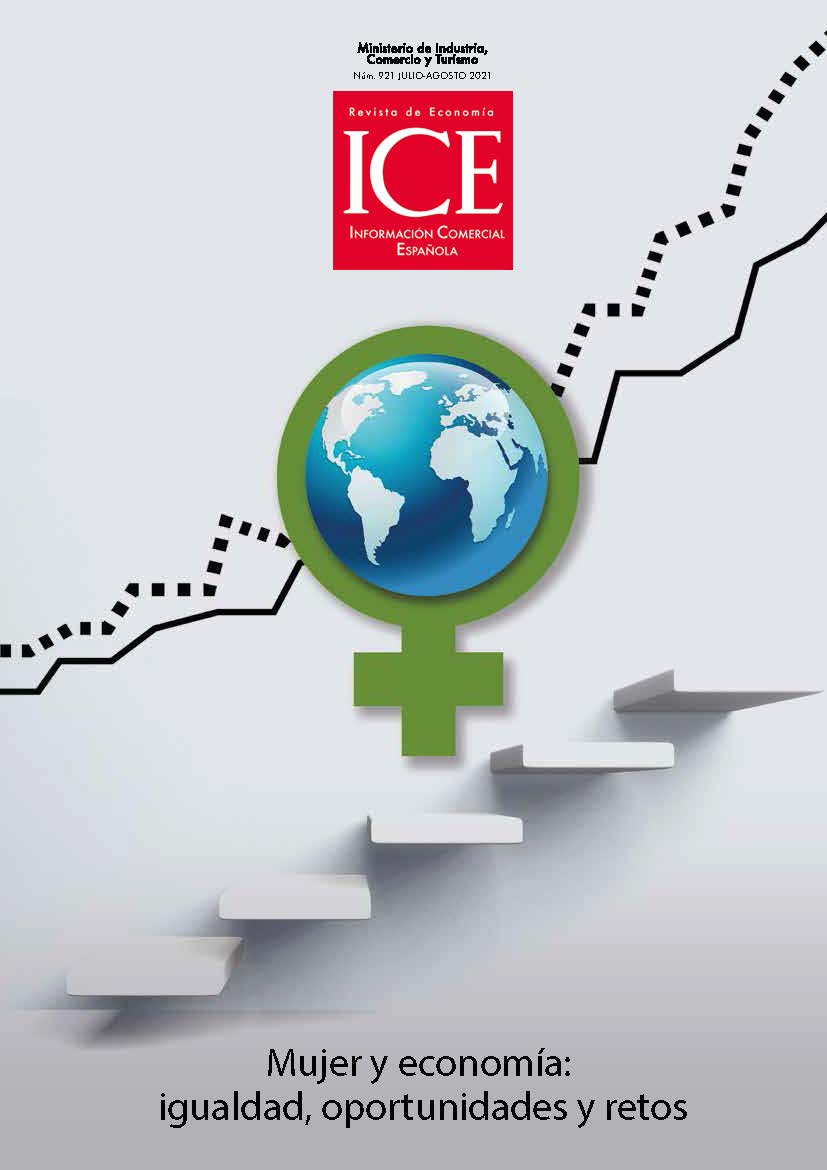Female researchers in Economics in Spain, Europe, America and other Areas, 1970-2020
##plugins.themes.bootstrap3.article.sidebar##
Downloads
##plugins.themes.bootstrap3.article.main##
The objective of this article is to contribute to the visibility of women economics researchers, both in Spain and in Europe, America and other geographical areas, during the period 1970-2020. Based on the information from the Dialnet and Ideas-Repec databases, we highlight many of the most qualified researchers, taking into account several indicators. In both bases there are numerous contributions of great interest and quality from Spanish female economists. A significant increase in female participation in economic research is observed in this period, but it is still insufficient in many countries. We present some supportive suggestions to promote female participation in economic research and also its visibility and social recognition.
##plugins.themes.bootstrap3.article.details##
Auriol, E., Friebel, G., & Wilhelm, S. (2020). Women in European Economics. Capítulo 2 in S. Lundberg (ed.), Women in Economics. CEPR Press.
Barreiro, J. M., Losada, F., & Ruzo, E. (2004). El Área de Comercialización e Investigación de Mercados en la universidad española: evolución y revisión de la actividad investigadora. Investigaciones Europeas de Dirección y Economía de la Empresa, 10(3), 111-125.
Blackaby, D., Booth, A. L., & Frank, J. (2005). Outside offers and the gender pay gap: empirical evidence from the UK academic labour market. The Economic Journal, 115(501), F81-F107.
Cancelo, M., & Bastida, M. (2013). La evaluación de la investigación en España: los sexenios en las áreas de Economía y Empresa. CIRIEC, Revista de Economía Pública, Social y Cooperativa, 78, 265-292.
Card, D., Dellavigna, S., Funk, P., & Iriberri, N. (2020). Are referees and editors in Economics gender neutral? Capítulo 11 in S. Lundberg (ed.), Women in Economics. CEPR Press.
Cerdá-Mansilla, E., & Álvarez, I. (2020). La internacionalización de las Universidades Españolas: patrones de colaboración, resultados y retos. Información Comercial Española (ICE), Revista de Economía, 913, 201-218. https://doi.org/10.32796/ice.2020.913.6984
Chari, A., & Goldsmith-Pimkham, P. (2017). Gender representation in Economics Across Topics and Time: Evidence from the NBER Summer Institute. NBER, Working Paper No. 23953.
Corsi, M., D´Ippoliti, C., & Zacchia, G. (2017). Gendered Careers: women economists in Italy. CEB, Working Paper No. 17/003, Solvay Brussels School of Economics and Management, ULB.
De Paola, M., & Scoppa, V. (2015). Gender discrimination and evaluators gender: evidence from Italian academia. Economica, 82(325), 162-188.
Delgado López-Cozar, E., Ràfols, I., & Abadal, E. (2021). Letter: A call for a radical change in research evaluation in Spain. Profesional de la Información, 30(3), e300309. https://revista.profesionaldelainformacion.com/index.php/EPI/article/view/86526/62972
Dolado, J. J., Felgueroso, F., & Almunia, M. (2012). Are men and women-economists evenly distributed across research fields? Some new empirical evidence. SERIEs: Journal of the Spanish Economic Association, 3(3), 367-393.
Educabase. (2018a). Estadísticas de Estudiantes matriculados en Grado y Ciclo. Estadísticas de universidades españolas de los Ministerios de Universidades y Educación y FP. http://estadisticas.mecd.gob.es/EducaDynPx/educabase/index.htm?type=pcaxis&path=/Universitaria/Alumnado/EEU_2021/GradoCiclo/Matriculados/&file=pcaxis&l=s0
Educabase. (2018b). Estadísticas de Personal de las Universidades Españolas: Personal Docente e Investigador de las Universidades Públicas. Estadísticas de universidades españolas de los Ministerios de Universidades y Educación y FP. https://www.educacionyfp.gob.es/servicios-al-ciudadano/estadisticas/universitaria/estadisticas/personal-universitario-copia.html
Emami, Z., & Olson, P. I. (2003). Engendering Economics: Conversations with Women Economists in the United States. Routledge.
Escribano, F., & Pardo, I. (2010). Mujer e investigación en economía. Información Comercial Española (ICE), Revista de Economía, 852, 1-12. http://www.revistasice.com/index.php/ICE/article/view/1308
Fernández, P., & Elvira, R. (2020). Los estudios de Economía en España. Serie histórica 1927-2018. Economistas, 167-168, 31-40. CEMAD.
Friebel, G., & Wilhelm, S. (2019). The Women in European Economics Monitoring Tool: Technical Description.
Guisan, M. C. (2018). Notable Spanish Women Economists: Pioneers, Doctoral Supervisors of Applied Economics and Top Researchers, 1975-2018. Regional and Sectoral Economic Studies, 18(1), 107-116. https://www.usc.gal/economet/rses.htm
Guisan, M. C. (2021). La investigación de Economía, en España, América Latina y Estados Unidos: Representación femenina y publicaciones destacadas. Serie Economic Development, Documento nº 125. https://ideas.repec.org/s/eaa/ecodev.html
Guisan, M. C., & Aguayo, E. (2020). Employment and Quality of Life of Women in Spain: Evolution 1970-2020 and International Comparisons. Applied Econometrics and International Development, 20(2), 57-74. https://www.usc.gal/economet/aedi.htm
Guisán, M. C., & Cancelo, M. T. (2006). Indicadores de producción científica en Economía, Ciencia y Tecnología. Análisis comparativo de España, Unión Europea y Estados Unidos, 2001-2006. Estudios Económicos de Desarrollo Internacional, 6(2), 37-57. https://www.usc.gal/economet/eedi.htm
Hicks, D., Wouters, P., Waltman, L., de-Rijcke, S., & Ràfols, I. (2015). Bibliometrics: The Leiden Manifesto for Research Metrics. Nature, 520(7548), 429-431.
Lundberg, S. (ed.). (2020). Women in Economics. CEPR Press. A VoxEU.org book.
Lundberg, S., & Stearns, J. (2020). Women in economics: stalled progress. Capítulo 1 in S. Lundberg (ed.), Women in Economics. CEPR Press.
Madden, K., & Dimand, R. (coords.). (2018). The Routledge Handbook of History of Women´s Economic Thought. Routledge.
Martínez i Castells, A. (2009). Revista de Economía Crítica, 7, primer semestre.
MCIU, Ministerio de Ciencia, Innovación y Universidades. (2018). Científicas en Cifras 2017. Ministerio de Ciencia, Innovación y Universidades. https://www.ciencia.gob.es/site-web/Secc-Servicios/Igualdad/cientificas-en-cifras.html
MECD, Ministerio de Educación, Cultura y Deporte. (2011). Lecturas sobre Economía de la Educación. [homenaje a María Jesús San Segundo]. María Jesús San Segundo Gómez de Cadiñanos (hom.). Ministerio de Educación, Cultura y Deporte.
Ministerio de Educación. (1974). Escalafón del Cuerpo Nacional de Catedráticos de Universidad. https://sede.educacion.gob.es/publiventa/descarga.action?f_codigo_agc=22233
OCDE, Organisation for Economic Co-operation and Development. (2020). Main Science and Technologial Indicators.
Perdices de Blas, L., & Gallego Abaroa, E. (coords.). (2007). Mujeres Economistas. Ecobook.
San Segundo, M. J. (2005). Promoción y remuneración del profesorado universitario: de la LRU a la LOU. Hacienda Púbica Española, 172, 93-117.
SIIU, Sistema Integrado de Información Universitaria. (2016). Estadística de Personal de las Universidades. Curso 2014-2015. Sistema Integrado de Información Universitaria. Ministerio de Universidades. Secretaría.


